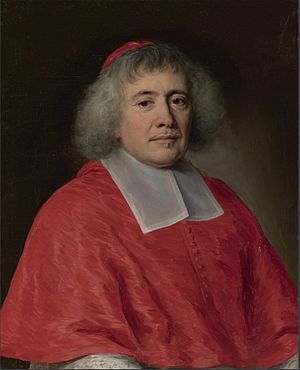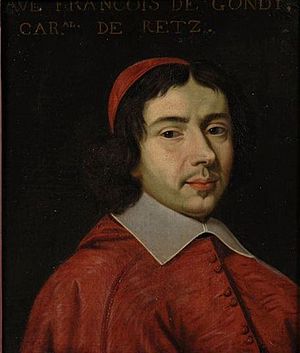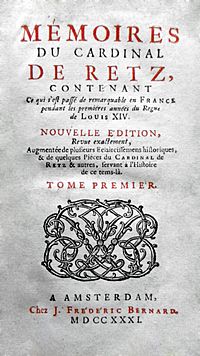Jean François Paul de Gondi facts for kids
Jean François Paul de Gondi, Cardinal de Retz (born September 20, 1613 – died August 24, 1679) was an important French church leader and writer. He is well-known for his Memoirs and for being a key figure in a time of political trouble in France called the Fronde.
His family, the Gondi family, originally came from Florence, Italy. They were brought to France by Catherine de' Medici, a powerful queen. The Gondi family became very wealthy and connected to many important families in France.
Contents
Early Life and Education
Jean-François de Gondi was born in Montmirail, a town in northern France. He was the third son in his family. Even though he wasn't very interested in joining the Church, his family had a lot of influence there and insisted he become a clergyman. They thought he wasn't suited to be a soldier because he was short, near-sighted, and a bit clumsy.
He was taught by St. Vincent de Paul, a famous saint, and studied at the Sorbonne, a well-known university in Paris. When he was just eighteen, he wrote a short historical essay called Conjuration de Fiesque. This essay had some bold ideas about changing how governments worked.
Becoming a Church Leader
Jean-François de Gondi didn't get any important church positions while Cardinal Richelieu, a powerful minister, was alive. But after Richelieu died, Jean-François was appointed to a special role in the archbishopric of Paris in 1643. This meant he would eventually become the Archbishop of Paris.
His uncle, who held the position before him, lived a very quiet life. But Jean-François was different. He quickly became very popular with the people of Paris. He used this popularity to turn them against Cardinal Mazarin, who was the chief minister at the time. This disagreement helped start the Fronde, a series of civil wars in France that began in 1648.
The Fronde and Exile
During the Fronde, Jean-François de Gondi mostly relied on the support of the middle-class people of Paris. He had some ideas about giving more freedom to the common people, and even about having a government run by the people. However, his political position wasn't very strong, and he often found himself in danger from his own supporters.
Even though the Fronde eventually fell apart, Jean-François was made a cardinal because of a misunderstanding by Pope Innocent X.
In 1652, he was arrested and put in prison. After two years, he managed to escape and traveled around Europe. He visited Rome several times and even helped choose a new Pope, Pope Alexander VII. In 1662, King Louis XIV allowed him to return to France and even asked him to be an envoy (a diplomatic representative) to Rome. To make this happen, he gave up his claim to be the Archbishop of Paris. He was then made the abbot of St-Denis, an important monastery, and received money he was owed.
Later Life and Writings
The last seventeen years of Cardinal de Retz's life were spent partly on diplomatic missions, partly in Paris, and mostly at his estates. He had a lot of debt, so in 1675, he gave most of his income to the people he owed money to. He died in Paris on August 24, 1679. During these final years, he wrote letters to Madame de Sévigné, who was a relative by marriage.
During the last ten years of his life, Retz wrote his famous Memoirs. These writings cover his life up to the year 1655. They are written as a story told to an unknown lady. His Memoirs are well-known for their excellent storytelling and for the vivid descriptions of the people he met. The famous writer Alexandre Dumas, père used a lot of information from these Memoirs for his novel Vingt ans après. Besides his Memoirs and his early essay, Retz also left behind diplomatic papers, sermons, and writings against Mazarin called Mazarinades.
Cardinal de Retz and François de La Rochefoucauld were two of the most talented writers who were involved in the Fronde. They were also personal and political rivals. La Rochefoucauld once wrote about Retz: "He stirred up the greatest disorder in the State, without having a clear plan of how to gain from it."
The Memoirs of the cardinal de Retz were first published in 1717, but they were not complete. The first good edition came out in 1836. A full collection of his works began to be published in 1870.
See also
 In Spanish: Jean-François Paul de Gondi para niños
In Spanish: Jean-François Paul de Gondi para niños
 | William Lucy |
 | Charles Hayes |
 | Cleveland Robinson |




